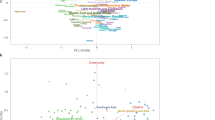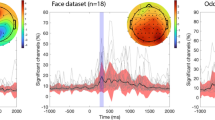Abstract
AN educated adult can tell which of two digits is the larger with virtually no uncertainty. By what process is this accomplished ? On the one hand, it is conceivable that such judgements are made in the same way as judgements of stimuli varying along physical continua. On the other hand, numerical judgements may be made at a different, less perceptual and more cognitive, level. For instance, the task may be one of memory access, each possible pair of numerals being stored with a corresponding inequality sign ; or perhaps some sort of digital computation is performed, such as counting the space between the two numerical values.
This is a preview of subscription content, access via your institution
Access options
Subscribe to this journal
Receive 51 print issues and online access
$199.00 per year
only $3.90 per issue
Buy this article
- Purchase on Springer Link
- Instant access to full article PDF
Prices may be subject to local taxes which are calculated during checkout
Similar content being viewed by others
References
Hemmon, V. A. C., Arch. Phil. Psychol. Sci. Meth., No. 8 (1906); Festinger, L., J. Exp. Psychol., 32, 291 (1943).
Lemmon, V. W., Arch. Psychol., 15, No. 94 (1927).
Welford, A. T., Ergonomics, 3, 189 (1960).
Author information
Authors and Affiliations
Rights and permissions
About this article
Cite this article
MOYER, R., LANDAUER, T. Time required for Judgements of Numerical Inequality. Nature 215, 1519–1520 (1967). https://doi.org/10.1038/2151519a0
Received:
Revised:
Issue Date:
DOI: https://doi.org/10.1038/2151519a0
This article is cited by
-
The role of development in the relationship between symbolic and non-symbolic numeric representations
Current Psychology (2024)
-
Effects of the perceived temporal distance of events on mental time travel and on its underlying brain circuits
Experimental Brain Research (2024)
-
What makes different number-space mappings interact?
Psychological Research (2024)
-
Structure sense in students’ quantity comparison and repeating pattern extension tasks: an eye-tracking study with first graders
Educational Studies in Mathematics (2024)
-
A General Model of Subjective Value and Stimulus-Intensity-Sensitive Hedonic Editing Strategy
Journal of Happiness Studies (2023)
Comments
By submitting a comment you agree to abide by our Terms and Community Guidelines. If you find something abusive or that does not comply with our terms or guidelines please flag it as inappropriate.



